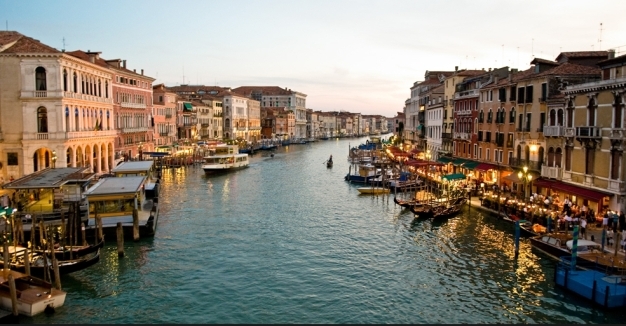Oligarchy: The Utopian System
Throughout history, people have written books describing ideal societies. For instance there is Plato’s “Republic”, Sir Thomas More’s “Utopia”, and Ayn Rand’s “Atlas Shrugged”. In her science fiction novel “Atlas Shrugged”, Ayn Rand describes a state set up by American businessmen in the Rocky Mountains. They find a valley suitable to live in and project a “force field”, so that from the outside the valley appears to be uninhabitable wilderness. They entice leading businessmen to disappear and move to this valley, from where they orchestrate a campaign of piracy to seize back from the Federal Government the wealth that has been extorted from them in taxes.
“Atlas Shrugged” is very famous in America, and Republican politicians keep copies in their offices along with the Bible as a sign of their conservative credentials. What many of them don’t realise is that a utopian state set up by businessmen actually existed. Ayn Rand’s story describes pretty much how the Republic of Venice came into being. People think of Venice as a place for tourists and art freaks, but many useful lessons can be drawn from the system of government that they had there for 1100 years.

Venice was neither a democracy nor a dictatorship. Throughout its history Venice was governed by a group of about 500 billionaires. These billionaires were called “noblemen”, but in those days this meant “billionaire”. The more money you had, the more noble you were. The ideas of nobility and money were inextricably linked, and a “duchess without dosh” would be a contradiction in terms, like a millionaire without a million.
The Venetian system of government was based on the Roman system of government before Julius Caesar introduced czarism. Before this, Roman society was divided into basically three classes. There was the Patrician class, made up of billionaires, who made the laws and commanded the armies. Then there was the Equestrian class, made up of millionaires, who had the privilege of serving in the army on horseback, as opposed to walking. They were also called Knights, and were the forerunners of the feudal knights like Sir Lancelot. Finally there was the Plebian class, of Roman citizens who didn’t have enough wealth to be classed as Knights.
Under the Roman system of government, all of the classes had influence, but the wealthier classes had more influence then the poorer classes. This appeared natural to people. The influence of the Plebian class was limited to vetoing the actions of the other classes. The Plebians elected Tribunes, who had the power of veto. For example, they could veto a law, or stop a prosecution, or stop the actions of an official.
The Roman system was carried over to Venice, in that the government was in the hands of the billionaires, but nothing important could be done without the approval of the ordinary citizens. Eventually it was found that the ordinary citizens always agreed with the wishes of the billionaires, and that their approval was a mere formality, so it was abolished, and the billionaires were officially in control of the government from then on.
You might imagine that a government run by billionaires would be a disagreeable place for ordinary people. After all, Australian employers seem to be constantly trying to get their employees to do more work for less pay. As it turned out, however, throughout its entire 1100 year history, Venice was the best place in the world for ordinary people to live. If you could send a message backwards in time to your ancestors, that message would be, “Move to Venice!”
To give an idea of how life was in those days, Eastern Europe was like China today, with both poor and well-off people. Western Europe was like North Korea today, with most people living in extreme poverty. Venice was like Hong Kong today, with most people having an adequate standard of living. Venice was a very healthy place to live, despite the primitive sanitation arrangements in those days, because the sea washed all the effluent away. Venice was so healthy that visitors would remark that there was a higher proportion of old people than anywhere else in the world.
The Venetian billionaires were very concerned to prevent a czarist system of government being set up. They had seen how the czarist system had led to the decline in size of the Roman Empire, with whole provinces being occupied by barbarian tribes. The problem with the czarist system was that 80% of the emperors were incompetent. The other 20% of emperors were good, but were unable to undo the damage that their incompetent predecessors caused.
In modern times, governments have tried the czarist system of government. Under Stalin, the Soviet Union gained control over a large part of the world. But all this was lost through Gorbachev’s incompetence. In Spain, General Franco defended traditional values, but his successor, King Juan Carlos, set up a “politically correct” regime and traditional values were swept away. This is the same with all dictatorships. No matter how careful and competent a dictator is, he cannot ensure that his successors will do a good job. His only hope is to set up an oligarchy like the Venetians did.
The Venetian billionaires were directly affected by the Roman Emperors’ incompetence. Originally they lived in Italy, but in the fifth century Italy was overrun by Gothic tribes. The plight of Romans was very similar to the situation for whites in Southern Africa today. The Goths would steal peoples’ belongings, occupy their houses and farms, and extort money from people. Many Romans moved to the eastern parts of the Roman Empire, just as many Southern African whites are moving east to Australia.
Some Romans noticed how the Goths had an aversion to water. The Goths couldn’t swim or sail boats, and being uneducated low-lifes, had no inclination to learn how to. The Romans realised that anyone who lived in the Venetian Islands would be safe from attack. Consequently many of them moved to the islands. The Venetians realised that if they set up a czarist government, some future dictator would give the islands to the Goths, so they resolved to prevent a dictatorship arising at all costs.
They appointed a Prime Minister, called the Doge, but made sure that he could do nothing without the approval of a council of other billionaires. The Prime Minister was required to be constantly in the company of other billionaires, to prevent him scheming to make himself a dictator. He had no formal powers at all, other than to suggest courses of action to the other billionaires. The following picture is of the Prime Minister Leonardo Loredan, a fifteenth century billionaire.
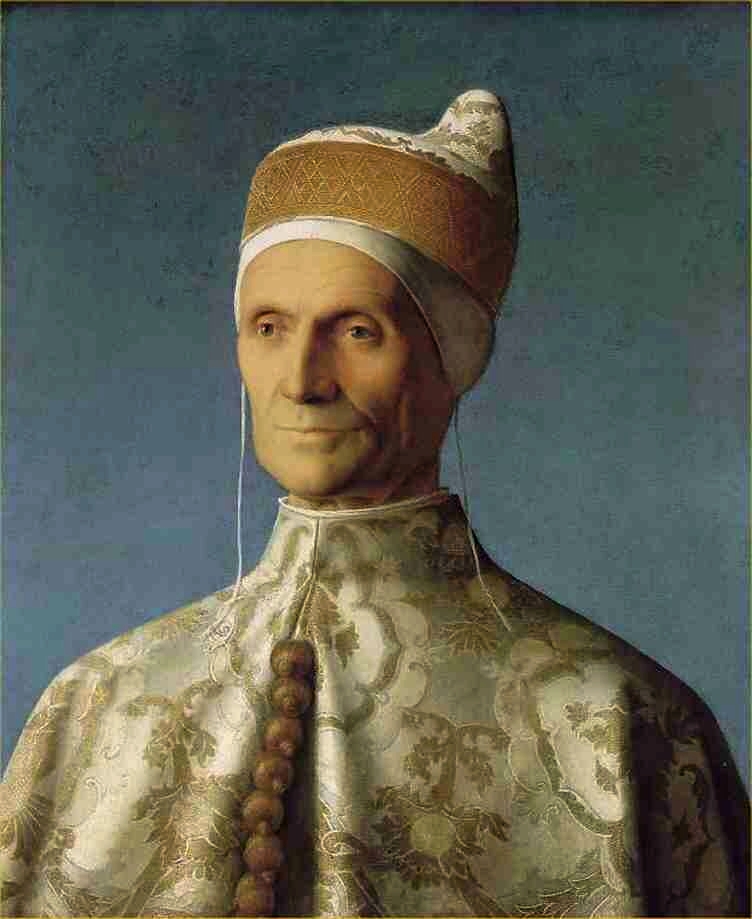
The Government was run by a Cabinet (Consiglio Minore), consisting of the Prime Minister and six other billionaires. The Cabinet was accountable to the Senate (Maggiore Consiglio, or Great Council) consisting of all the billionaires. Many important affairs of state were supervised by Senate Committees (Savii del Consiglio). Justice was enforced by a Judicial Committee (Quarantia), consisting of billionaires who held various judicial offices.
Outside the Prime Minister’s residence and government headquarters, shown below, the billionaires set up an alabaster scaffold. This was to hang the Prime Minister from if he got out of line. It was a constant reminder to the Prime Minister that his fellow billionaires were in control. On the other hand, the Prime Minister didn’t need to worry about what would happen to his family and friends after he died. He knew that his family and friends would not be put on trial for corruption or war crimes because the same regime would always be in power.
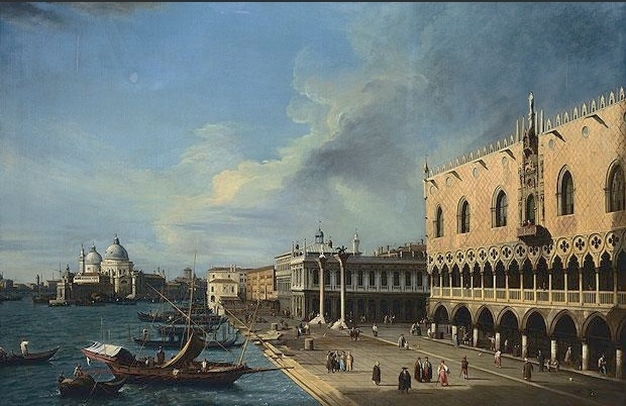
A system of government where power is vested in a considerable number of people, but not in the whole population, is called an oligarchy. The oligarchy in Venice was remarkably stable in that it lasted for 1100 years, up until Napoleon occupied Venice in 1797. This was all the more amazing since the population of Venice was only about 200,000. Australia has enough trouble finding good politicians with our population of 24 million, so it would be much harder with an island nation of 200,000. It shows what an effective system of government oligarchy is.
Oligarchy is a historically proven system of government, but this is not the case with democracy. Democracy has only existed in unusual conditions, for short periods of time. In ancient Greece, for about 300 years, some of the Greek towns had democracy. Plato told how his teacher, the famous philosopher Socrates, was executed by the democratic Athenian government. Democracy also arose spontaneously in native tribes around the world. The Greeks were the first native tribes to document their democratic practices, just as they were the first to document cannibalism and incest. In the same way that it would be wrong to say that the Greeks invented cannibalism and incest, so it would be wrong to say they invented democracy. For most of Greek history, the Greeks have had a czarist system of government.
Democracy arose in Britain after the English Civil War. Not everyone was allowed to vote. Only men with a certain amount of property could vote. This was also the case in the United States, where only white men with a certain amount of property had the vote. The poll tax prevented blacks from voting in some American states until the 1960s. Arguably this meant that America and Britain were oligarchies and not democracies.
Democracy as we understand it today arose as a result of the Counterculture Movement by the Catholic pressure groups in the 1960s The pressure groups insisted that everyone over 18 years should be able to vote, and that all electoral districts must have the same number of voters. In theory this was supposed to give effect to the will of the people. In practice it has meant that countries like Australia have been taken over by their Catholic minority.
Everyone knows that the majority of Australians want the death penalty reintroduced, and homosexuality banned as it has been for the last 7000 years of recorded history. This is the will of the Australian people. Democracy has not given effect to the will of the people. Democracy has failed. Democracy, like the element sodium, can’t exist in nature.
In the whole of recorded history, democracy has been in effect only for the last 40 years, and before that for 300 years in ancient Greece. That is the only track record for democracy. Whenever democracy has been in effect, it has been shown not to work. Similarly, czarism has been shown not to work. The only system of government with a proven track record is oligarchy.

One of the reasons for the outstanding success of the regime in Venice may have been the ratio of billionaires, or Senators as they were also called, to ordinary people. This was about 1 in 400, or one Senator for every 400 ordinary people. With such a high ratio, every person in Venice would have met a Senator. Senators would know everything that was going on in Venice, and could take immediate action to deal with problems.
Suppose the ratio was much less than 1 in 400. Suppose it was 1 Senator to every 10,000 people. In that case, a Senator would be out of touch with what was going on. Problems would occur and not be dealt with. This is how the western half of the Roman Empire was lost. On the other hand, suppose that the ratio was more than 1 in 100. It would be like voters today. Senators would see that they had no control over the government. They would see it as a waste of time to try to deal with problems. The government would be taken over by some faction as in Australia where it has been taken over by the Catholics.
The Senators in Venice were hereditary. You would automatically become a Senator if you had noble parents. Also if you were a billionaire and your family had lived in Venice for generations, and you made a large donation to the government, they would make you a Senator. This would give you the right to put the letters “N.H.” after your name (short for “Nobleman” in Latin); it beats “B.A.”. The Venetian system of selecting Senators does not however appear to be crucial to the success of the Venetian system of government. What was crucial appears to have been the ratio of Senators to ordinary people.
So, for example, you could have a oligarchy where control of the government is vested in one political party. This is the situation in China. The country is governed by Communist Party members, who are approximately 1 in 400 of the population, and the government appears to be doing the sort of things that a good government would do. The Communist Party is communist in name only, and in reality is the China Party. The Chinese have arrived at the ideal system of government, so better that they keep this system of government, and not become a democracy like Australia.
We have seen how Venice was the best place in the world to live from an economic point of view. But it was also the best place from a cultural point of view. After the Goths, Vandals, Saxons, Normans, and other barbarian tribes occupied Western Europe, a civilised way of life practically disappeared. Culture was limited to going to church on Sunday and to the occasional fair.

In Venice and Eastern Europe, the traditional Roman culture continued. This was similar to our culture today, apart from the great emphasis on religion. In the fifteenth century, after the Turks occupied the Roman Empire, many Roman refugees travelled to Western Europe. These Greeks, as they were called in Western Europe, brought with them their Roman culture, and this was the start of the Renaissance, where Roman culture was reintroduced to Western Europe.
Roman culture always existed in Venice. The relationship between Venice and the Roman Empire was like the relationship between Australia and England. The capital of the Roman Empire, Constantinople, was seen by Venetians as “the old country”. Just as previous generations of Australian men admired English girls (“You’ll come a-waltzing Matilda with me”), Venetian men admired Greek girls, and Venetian families intermarried with Constantinople families. Venetians had the same culture as the Greeks living in Constantinople.
Despite having Greek culture, the Venetians spoke a dialect of Latin, similar to modern Italian. Official records were kept in Latin. A feature of the Venetian dialect was not using long words. Unlike the Greeks, who loved long words, the Venetians would replace a long word with something short. Instead of saying “Santi Giovanni e Paolo” they would say “San Zanipolo”. Instead of saying “San Nicolo al Lido” they would say “Santa Claus”.
Nowadays, whenever anyone suggests a political policy that is agreeable to the mainstream population, the Catholic media tell us that we mustn’t do it, because it will be the end of Western civilisation. For example, they say that if we ban protests by the pressure groups, we will go back to having a North Korean standard of living, and Western culture will be wiped out. We can evaluate this claim of the media magnates by looking at Venice, which acted as a repository for Western culture. If they had a certain policy in Venice, it must be safe to have in Australia.
In Venice, all protests were banned, except that people could write to senators expressing a grievance without fear of getting into trouble. The Venetians had a Committee for State Security (Consiglio dei Dieci) consisting of ten Senators. As a safeguard, these Senators held office for only a year. The Committee for State Security controlled a staff of fulltime secret police. The Committee had the power to impose penalties, including death, on people engaging in unauthorised political activity.
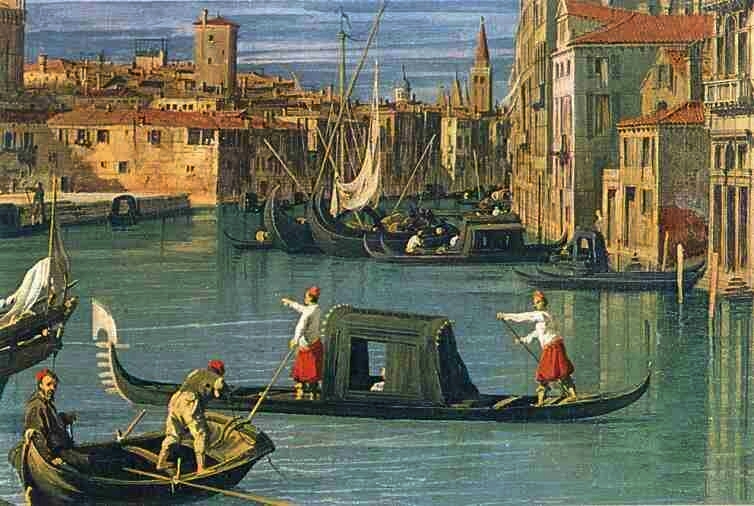
They didn’t have “economic rationalism” in Venice. The role of the government, as far as the Venetian billionaires were concerned, was not to maintain a “level playing field”, but to help the billionaires become richer. The Venetians saw nothing wrong with state-owned enterprises. They had the largest shipyard in the world, called the Arsenal, owned by the government, which mass-produced ships, which were then leased to Venetian businessmen.
The Venetian nobles didn’t have a monopoly on business. Any Venetian could set up a business. The Venetians had Roman law, according to which ordinary citizens, that is plebians, had the same legal rights as nobles. The only difference between a plebian and a noble in the eyes of the Venetians was that a noble had more money than a plebian. That was the definition of a noble. It is like nowadays, where ordinary people have the same legal rights as billionaires.
The equality of opportunity in Venice is shown by the large number of palaces. Venice has more palaces than any other European city. London has a handful of palaces, while Venice has hundreds. This is because, if someone built a palace in England, the King would bring a trumped-up charge against the owner, have him executed, and confiscate the palace for himself. In Venice, however, the government was geared up to preventing people from being parted from their hard-earned wealth. The ridiculous lawsuits that are brought in American courts would be thrown out in an instant by a Venetian court.
A typical Venetian palace is shown in the next picture. Due to a lack of space in the Venetian Islands, Venetian palaces are high-rise buildings. Although most palaces have four storeys and an attic, a Venetian ceiling is about twice as high as an Australian ceiling, so in effect the palaces are nine stories high. As you would expect with billionaires’ houses, the rooms are much larger than in Australian homes.
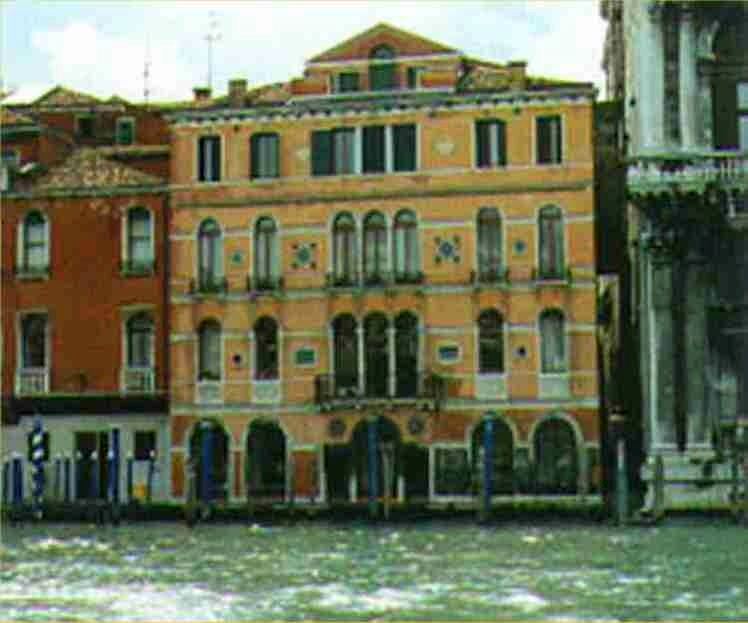
The interior and exterior design of Venetian palaces is based on the design of the Sacred Palace of the Roman Emperors in Constantinople. This is the most luxurious building complex that ever existed anywhere at any time. Unfortunately it has been destroyed, but by all accounts the luxuriousness and good taste of this Palace is difficult for the mind to comprehend. The Winter Palace in St Petersburg and the Topkapi Palace in Istanbul are based on the Sacred Palace of Constantinople.
The Venetian legal system was different from the “feudal system” that the barbarians introduced to Western Europe. Under the feudal system, the only rights people had were those that their overlord allowed them. Anything not specifically allowed was forbidden. This contrasts with Roman law, where a man’s home is his castle, and he can do whatever he likes unless the government specifically prohibits it. Gradually feudal law was modified. English law started off as “honour amongst thieves”, and ended up for all practical purposes the same as Roman law.
A striking feature of Venetian life was the role of the Catholic Church. Venice was a Catholic country, and the Venetian nobles were Catholics. Unlike other Catholic countries, however, the Venetians kept their clergy on a tight leash. They recognised the potential of the Catholic Church for abuse.
In Venice, the clergy were not appointed by the Catholic Church, but by the government. A priest or a monk would only be appointed if he came from a wealthy family and supported the existing social order. Priests were not above the law, as they were in many parts of Western Europe. If a priest was found sleeping with women, he would be executed. The Venetians liked to schedule their executions of Catholic priests to coincide with the arrival of visiting Protestants.
The Catholic Church’s Inquisition operated in Venice as in many other parts of Europe. But no-one was ever executed in Venice for being a Protestant. People were only ever executed for slandering Christianity. If Karl Marx had lived in Venice, he would have been executed for saying that religion is the opiate of the people. Venice was the only place in Europe that welcomed Jews throughout its history. The Jews were eventually expelled after they organised the French Revolution, but they can’t say that the Venetians didn’t give them “a fair go”, at a time when for some reason everyone else in Europe hated them.
In the last years of the Republic of Venice, the billionaires saw that their ideal system of government was under threat. So they sought to spread their system of government to the rest of the world. At about this time, Freemasonry came into being. It was claimed that Freemasonry had existed throughout history as a trade union for stonemasons. Freemasons were told that their society had started in ancient Egypt. There is no evidence however of Freemasonry existing before the 18th century. Venice was the only place around where people held Freemason type ideas, so that is probably where Freemasonry started.
Freemasonry spread from Northern Italy to England and North America. The American Founding Fathers were Freemasons. This is evident from the Freemason symbols on American banknotes. The original United States Constitution was based on the Venetian system of government. For example, there is a Senate, and participation in the government was originally restricted to the wealthy.
The Catholic Church claims that Freemasonry is anti-Christian, and that Freemasons worship one of the pagan gods of ancient Egypt. If we consider the sort of men who are Freemasons, however, we see that they would have nothing to do with worshipping pagan gods. For example, when some Presbyterian churches amalgamated with the Methodist Church to form the Uniting Church, many Freemasons stopped attending the Uniting Church. This was because some Uniting Church ministers admitted that they had not been called by God to become ministers. This is considered a prerequisite to being a minister.
If Freemasons who have attended church every Sunday all their lives without fail suddenly stop attending church because of un-Christian practices, clearly they would also stop attending meetings of the Freemasons if they thought that there was anything pagan about it. The claim that the Freemasons is anti-Christian is just propaganda. The real reason that the Catholic Church is against the Freemasons is because the Freemasons won’t let Catholic priests get away with homosexuality, pedophilia and other abuses.
Venetian history has many lessons that can be applied to solving problems in Australia today. If you read for example “Venice” by Lord Norwich, you will see that the only thing wrong with Venice is that they didn’t have the advanced technology that we have today. If the Republic of Venice still existed, it would have the most advanced technology, and would be the best place in the world to live. It would probably be the centre for the computing industry instead of Silicon Valley, and the Doge of Venice would be Bill Gates.
